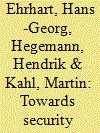| Srl | Item |
| 1 |
ID:
116874


|
|
|
|
|
| Publication |
2012.
|
| Summary/Abstract |
In the past three decades, citizen participation has been heralded as the hallmark of democracy and economic transparency. Yet citizen participation has not been limited to political and economic processes. In this paper I consider the incorporation of participatory measures in an arena frequently overlooked: security provision. I trace the origins, evolution and effects of efforts to increase citizen participation in security provision in Colombia. Despite notorious images of paramilitary forces, guerrilla insurgents and vigilante groups, citizen participation in security provision tends to be banal, boring and not particularly effective, as average people attend local meetings, work through state bureaucracy, and comply with new policy initiatives. I argue that insecurity in Colombia is neither a product of apathetic citizens nor of violent, uncontrollable mobs, but rather part and parcel of an emerging form of governance in which citizens are made responsible for their own security provision.
|
|
|
|
|
|
|
|
|
|
|
|
|
|
|
|
| 2 |
ID:
128234


|
|
|
|
|
| Publication |
2014.
|
| Summary/Abstract |
This article argues that security governance can and should be reframed as a critical tool that enables us to understand and reappraise concrete practices of security provision. Security governance needs to move beyond the functional mapping of different governing arrangements and the presumption that security governance leads to effective and legitimate problem-solving in a quasi-automatic manner. In this article, we propose a framework that identifies the essential characteristics of security governance and turns them into critical questions with the aim to reveal persisting frictions and dilemmas. First, we trace the rise of security governance as concept and practice over the past decade and identify its central characteristics with regard to prerequisites, structures and consequences. Second, we reframe the core characteristics of security governance into critical questions and thereby develop an understanding of security governance as a critical tool. Finally, we illustrate the relevance of this approach with examples from EU security governance.
|
|
|
|
|
|
|
|
|
|
|
|
|
|
|
|